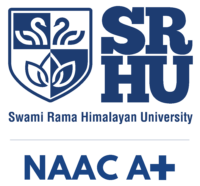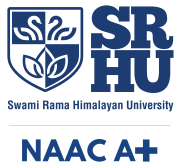Policy for Addressing Poverty
November 4, 2025 2025-11-15 6:31Policy for Addressing Poverty
Policy for Addressing Poverty
| Approved | Board of Management on 12th January 2019 |
| Notification | Notified by Registrar vide notification No. SRHU/Reg/OO/2019-04 (i) dated 15th January 2019 |
| Reviewed / Revised | Board of Management on 29th March 2022 |
| Notification | Notified by Registrar vide notification No. SRHU/Reg/OO/2022-58 (i) dated 5th April 2022 |
| Next Review | 2025–26 |
Swami Rama Himalayan University
Swami Ram Nagar, Jolly Grant – 248016, Dehradun, Uttarakhand
- 1. Short Title & Commencement
- 1.1 This Policy shall be called the “Policy for Addressing Poverty” of Swami Rama Himalayan University.
- 1.2 This Policy shall be deemed to have come into force from the date of approval of the Board of Management of the University.
- 2. Purpose
The purpose of this policy is to ensure that poverty does not become a barrier to accessing and benefiting from higher education. The University acknowledges its social responsibility to promote equity, inclusion, and sustainable development by supporting economically disadvantaged students and engaging with communities to reduce poverty.This policy aims to:
- 2.1 Strengthen institutional mechanisms for financial and social support.
- 2.2 Encourage educational and economic empowerment of marginalized sections.
- 2.3 Align university activities with Sustainable Development Goal 1 (No Poverty) and the National Education Policy (NEP) 2020.
- 3. Scope
This policy applies to:
- 3.1 All students, faculty, and staff within the University.
- 3.2 University-led community engagement and outreach programs in rural or economically weaker regions.
- 3.3 Institutional collaborations with government, NGOs, and industries aimed at social upliftment.
- 4. Goals
- 4.1 To provide equitable access to quality education for students from low-income backgrounds.
- 4.2 To promote skill development, employability, and entrepreneurship among disadvantaged groups.
- 4.3 To strengthen the University’s role as a catalyst for social transformation.
- 4.4 To foster research, innovation, and outreach focused on poverty reduction and sustainable livelihoods.
- 5. Strategic Actions
- 5.1 Educational Access and Equity
- 5.1.1 Offer need-based and merit-cum-means scholarships.
- 5.1.2 Implement flexible payment schemes and financial counseling.
- 5.1.3 Conduct bridge and remedial courses for first-generation learners.
- 5.1.4 Ensure non-discriminatory admission and academic practices.
- 5.2 Economic Empowerment and Employment
- 5.2.1 Organize skill development, vocational, and entrepreneurship programs.
- 5.2.2 Create on-campus employment opportunities for needy students.
- 5.2.3 Collaborate with industries for training, internships, and placement of underprivileged learners.
- 5.3 Research and Innovation
- 5.3.1 Encourage research projects addressing poverty, inequality, and sustainable livelihoods.
- 5.3.2 Promote innovation and social entrepreneurship as tools for community empowerment.
- 5.3.3 Publish and disseminate findings to influence local and national policy-making.
- 5.4 Community Outreach and Extension
- 5.4.1 Implement extension activities in rural and marginalized communities.
- 5.4.2 Partner with local bodies, NGOs, and self-help groups to deliver social impact programs.
- 5.4.3 Include service-learning components in academic curricula.
- 5.5 Institutional Mechanisms
- 5.5.1 Establish a Social Responsibility and Inclusion Cell (SRIC) under IQAC/Dean Student Welfare.
- 5.5.2 Allocate institutional funds and seek CSR or donor contributions.
- 5.5.3 Maintain a database of beneficiaries and program outcomes.
- 5.1 Educational Access and Equity
- 6. Implementation
- 6.1 The SRIC will oversee execution, monitoring, and evaluation.
- 6.2 Departments and schools will integrate poverty-related initiatives into academic and extracurricular planning.
- 6.3 Annual action plans and reports will be submitted to the University Academic Council or Governing Body for review.
- 7. Monitoring and Evaluation
- 7.1 Periodic assessment of the effectiveness of scholarships, skill programs, and outreach activities.
- 7.2 Collection of feedback from students and community partners.
- 7.3 Regular review meetings to ensure transparency and accountability.
- 8. This policy shall be reviewed every three years or earlier if required.
- 9. The University reserves the right to interpret, alter, amend, modify, cancel or withdraw any or all provisions mentioned herein above.
- 10. In case of any dispute, the decision of the Vice Chancellor of the University shall be final and binding.

